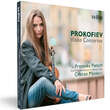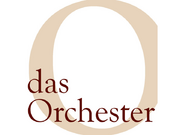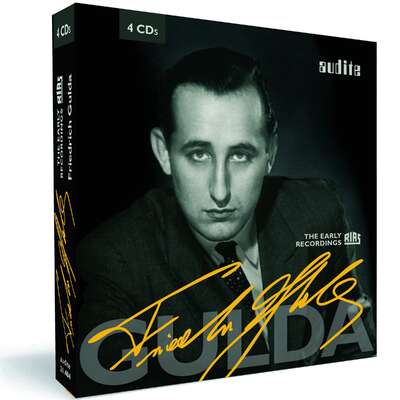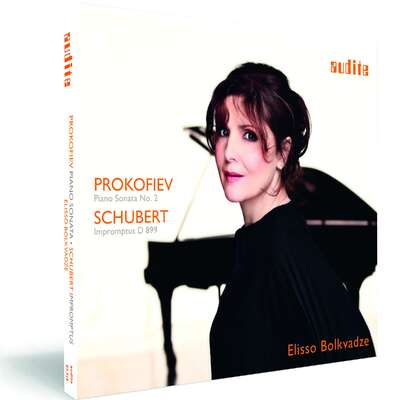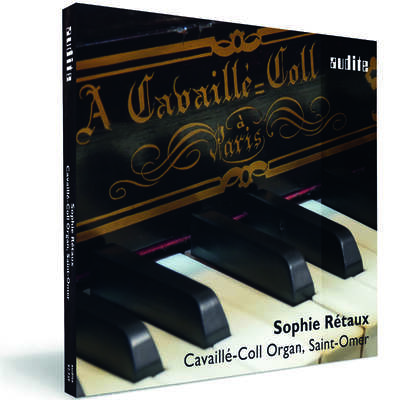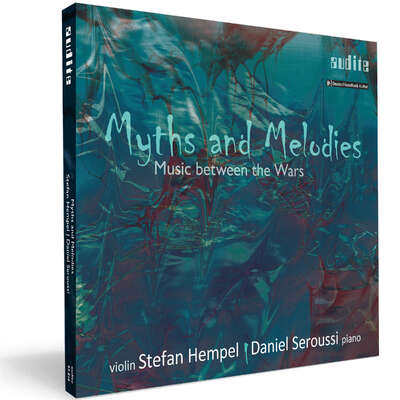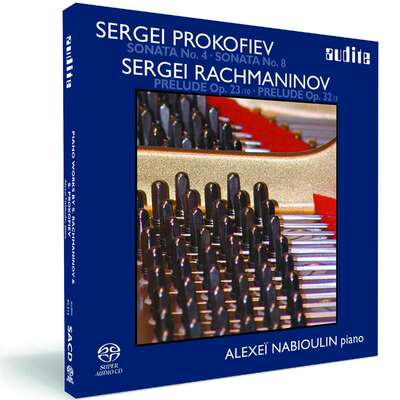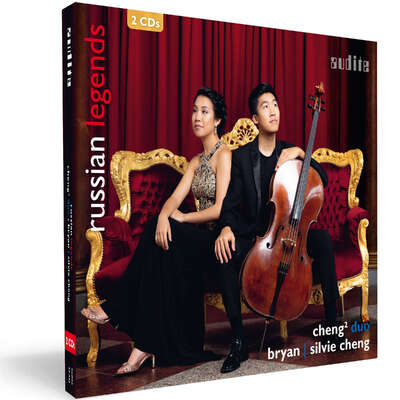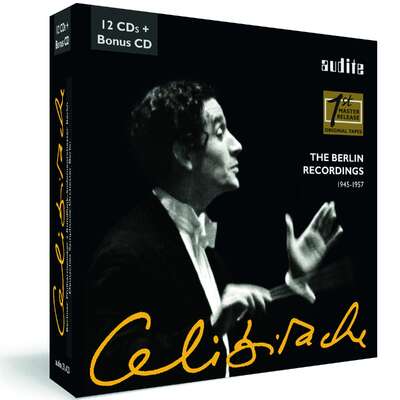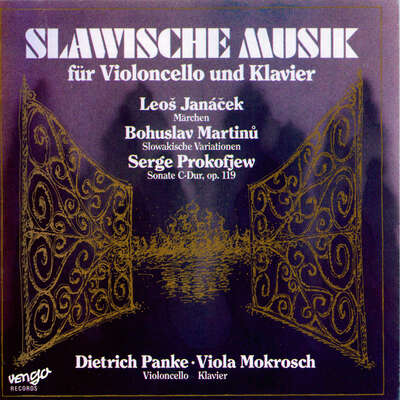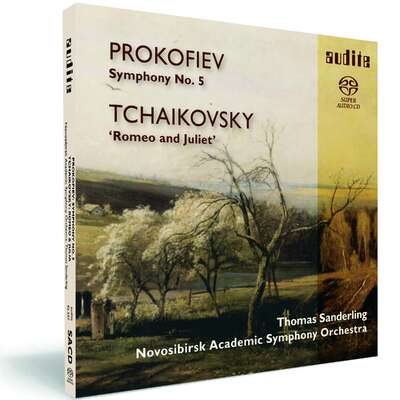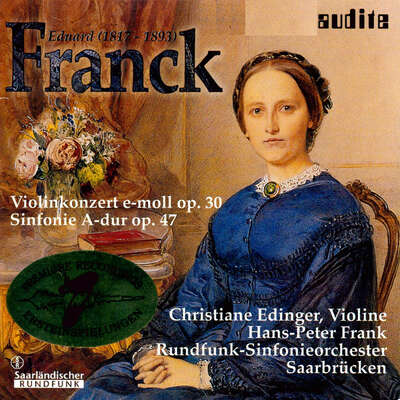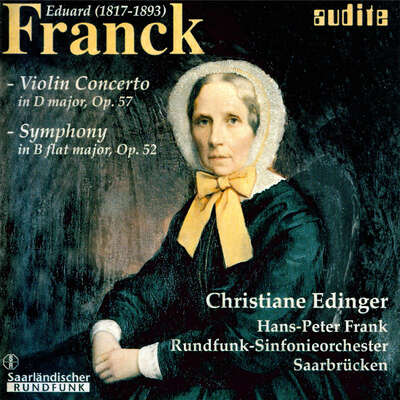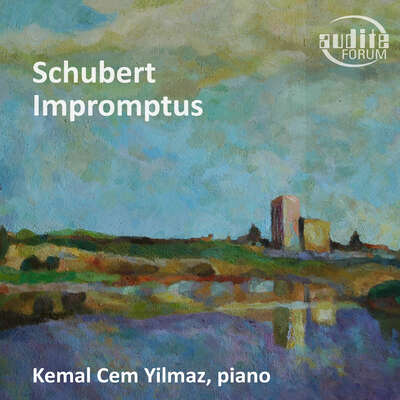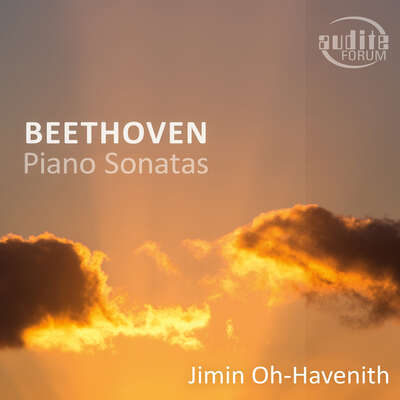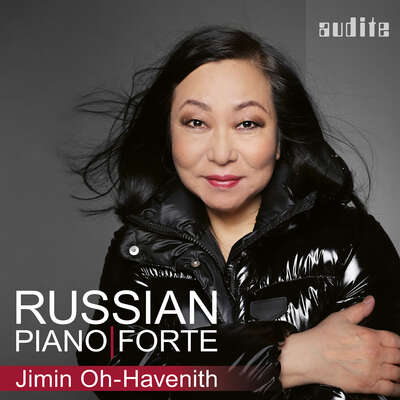
Die beiden Violinkonzerte Sergei Prokofjews markieren Anfang und Ende seines Exils, den frühen, herausfordernden Klassizismus und den künstlerischen Weg aus dem »Nomadenleben« des Exils zurück in die Heimat. Franziska Pietsch ist seit ihrer Karriere als Jungstar der DDR eng mit der Musik des russischen Komponisten vertraut – die berufene Interpretin für die verschiedenen Seiten in Prokofjews virtuoser Tonsprache. mehr
"Spannend bis zum Schluss. Eine Referenzaufnahme für beide Konzerte!" (Concerti)
Details
| Sergei Prokofiev: Violin Concertos | |
| Artikelnummer: | 97.733 |
|---|---|
| EAN-Code: | 4022143977335 |
| Preisgruppe: | BCA |
| Veröffentlichungsdatum: | 13. Oktober 2017 |
| Spielzeit: | 50 min. |
Zusatzmaterial
Informationen
Nach Sergei Prokofjews Werken für Violine und Klavier legt Franziska Pietsch nun die Einspielung beider Violinkonzerte des russischen Komponisten vor. Mit dessen Œuvre und Tonsprache ist die Künstlerin als ehemaliger Jungstar der DDR seit ihrer frühen Jugend vertraut. Zusammen mit Cristian Măcelaru und dem Deutschen Symphonie-Orchester Berlin beeindruckt sie mit einer packenden Neueinspielung.
Die beiden Violinkonzerte repräsentieren zwei Phasen und zwei Seiten in Prokofjews Leben und Komponieren. Das erste wurde in der Ära der frühen Erfolge, in zeitlicher und stilistischer Nachbarschaft zur ›Symphonie classique‹ geschrieben, aber erst im Exil uraufgeführt. Das zweite spiegelt das Reiseleben seiner Exilzeit, aber auch das Verlangen, wieder nach Russland zurückzukehren.
Franziska Pietsch, „Anne-Sophie Mutter des Ostens" (W. Dulisch)
Vom Jungstar der DDR mit Solo-Orchesterkarriere über Boykott, Neuanfang, Kammermusik und Konzertmeistertätigkeit zurück zur Solistin, nun bereichert durch das veränderte Rollenverständnis: Mit der vorliegenden Solo-Orchester-CD schließt sich der Kreis. Durch ihre intensive Beschäftigung mit der Kammermusik und Tätigkeit als Konzertmeisterin versteht es Franziska Pietsch auch als Solistin mit Orchester, auf außergewöhnliche Weise höchsten solistischen Anspruch mit kammermusikalischer Intimität zu verbinden.
Besprechungen
Süddeutsche Zeitung | Magazin Heft 26/2019 27. Juni 2019 | Carolin Pirich | 27. Juni 2019
GEGEN DEN STRICH
Als sie jung war, blockierte die DDR ihre Karriere. Jetzt stößt sie an die Grenzen der Musikbranche. Aber Grenzen sind ihre Spezialität: die erstaunliche Geschichte der Ausnahmegeigerin Franziska Pietsch
Sie fragt: Vielleicht möchten Sie mich in Aktion sehen? Man hätte dannMehr lesen
www.schallplattenkritik.de | 16. Februar 2018 | Norbert Hornig | 3. Oktober 2018 | Quelle: https://www.scha...
Franziska Pietsch hat sich in den letzten Jahren als hoch expressiv gestaltende Kammermusikerin profiliert, aus ihren Aufnahmen spricht eineMehr lesen
www.elegantclassics.cz | 24.09.2018 | Miloš Bittner | 24. September 2018 | Quelle: https://www.eleg...
Vynikající a promyšlená repertoárová volba, ale i další hmatatelné i nehmatatelné ohledy, které řadí tuto nahrávku do kategorie "mimořádně zdařilé", to vše charakterizuje toto album.Mehr lesen
Classica – le meilleur de la musique classique & de la hi-fi | Numéro 202 - Mai 2018 | Clément Serrano | 1. Mai 2018
Dans un entretien récent. Lisa Batiashvili dressait un portrait plutôtMehr lesen
American Record Guide | May/June 2018 | Stephen Wright | 1. Mai 2018
Exceptionally good recording and performance. Ms Pietsch’s violin growls, spits, and croons; it whispers and whistles. Her lines have clearMehr lesen
I compared this to Arabella Steinbacher on Pentatone (J/A 2014). Steinbacher’s magical slow-motion gossamer coda of Concerto 1’s first movement makes me hold my breath, I don’t want to miss a note, and her performances are altogether mellower, lacking the crunch and flying sparks of Pietsch. With my ears still full of Pentatone’s enveloping surround sound, I again listened to this and was impressed by its full-bodied sound, not at all the disappointment I usually feel on losing SACD’s third dimension. I confess I sometimes read as I listen to music, but this tore my attention from the page again and again. These are gripping performances that can’t be ignored.
www.musicweb-international.com | Wednesday April 4th | Michael Cookson | 4. April 2018 | Quelle: http://www.music...
Released in 2016 Franziska Pietsch with pianist Detlev Eisinger recorded Prokofiev’s two violin sonatas and cinq mélodies on Audite. On the sameMehr lesen
The first violin concerto is a relatively early work composed in 1916/17 and one of the last to be written before Prokofiev left Russia. Prokofiev ensures that the violin part is dominant although it is not pitted dramatically against the orchestra but more part of it. Nevertheless, it is an excellent score and I would like to see it programmed far more than it currently is. Undoubtedly Prokofiev’s works were a source of inspiration to a generation of composers. When I hear the Walton violin concerto (1939, re-orchestrated 1943) it reminds me strongly of these Prokofiev scores which the English composer must surely have known especially the first concerto premiered over fifteen years earlier in 1923. In the fascinating opening movement Andantino Franziska Pietsch creates a heavy and intense atmosphere that evokes an icy Russian chill which makes me shiver such is the passion of her assured playing. Admirable is the way the Halle born Pietsch accelerates through the movement’s propulsive climax. The music of the sardonic Scherzo just flashes along briskly with the committed soloist negotiating the wonderful contemporary writing and the mischievous sounding effects. In the Finale Pietsch creates an atmospheric world of inscrutability and introspection with Cristian Măcelaru directing the Berlin orchestra in an explosion of passionate lyricism. The shimmering violin line feels as if Pietsch has dipped her violin (made by Carlo Antonio Testore, Milan, 1751) in liquid gold such is the gleaming quality of the sound it produces. Pietsch imparts the potent elements of intensity and deep concentration creating a highly charged atmosphere seldom encountered in this work.
From 1935 the second violin concerto tends to be overshadowed by the first concerto. Certainly, a high-quality score Prokofiev’s writing is highly melodic and more overtly romantic than the earlier concerto. In the opening movement Allegro moderato one immediately notices the concerto has relatively lighter scoring. Pietsch continues her splendid form throughout the long and varied melodic line revelling in the vivid and deliciously warm colours. The central Andante movement sounds so meltingly lyrical in Pietsch’s hands and throughout the Finale: Allegro, ben marcato her spirit and verve stand out prominently.
Pietsch produces compelling and intensely passionate interpretations of both concertos complemented by accomplished support from Deutsches Symphonie-Orchester Berlin under Cristian Măcelaru. Excellent sound quality throughout this album from the renowned acoustic of Jesus-Christus-Kirche, Dahlem with the Audite engineers providing vividly clear and well balanced sonics. In addition, I really appreciate the informative and readable booklet essay by Habakuk Traber. My only grumble is with the available space on the CD, enough to have accommodated an additional work.
Franziska Pietsch’s recording of Prokofiev’s violin concertos rubs shoulders with the finest in the catalogue. My first choice and probably the best-known is the now ‘classic’ recording from soloist Kyung-Wha Chung and London Philharmonic Orchestra under André Previn. Recorded in 1975 at Kingsway Hall, London, Chung plays passionately displaying a wonderful tone and control with Previn and LPO highly sensitive partners. A generous coupling on this Decca album is Chung’s striking account of the Stravinsky violin concerto. Another rival version of the pair of concertos that holds the attention is from soloist Arabella Steinbacher with Russian National Orchestra under Vasily Petrenko. Recorded in 2012 at Moscow Tchaikovsky Conservatory, Steinbacher’s coupling is the composer’s solo violin sonata, Op. 115 on Pentatone.
With Franziska Pietsch in such stunning form there is little reason to hesitate with this album of the Prokofiev violin concertos.
www.amazon.de | 13. März 2018 | 13. März 2018 | Quelle: https://www.amaz... Beautiful, spacious readings of Prokofiev
There have been quite a few recordings of these wonderful concertos lately, but these are quite excellent. Pietsch and Macelaru play them beautifullyMehr lesen
www.musicweb-international.com | Tuesday March 6th | Richard Kraus | 6. März 2018 | Quelle: http://www.music...
Franziska Pietsch, a one-time East German prodigy, has followed a fine, rather dark reading of Prokofiev’s two violin sonatas with an equallyMehr lesen
In the first concerto, Pietsch soars lyrically from the outset, although with a touch of mystery. Her scherzo is rudely demonic, and exciting to hear. The final movement contains lots of lush, romantic music, which Pietsch plays with a knowing glance and not a hint of naiveté. Pietsch is a forceful musical personality. She doesn’t quite swagger, but plays with wonderful self-assurance. Her performance has more bite than the fine precision of that by Julia Fischer, and is better recorded than that of Arabella Steinbacher.
In the second concerto, Pietsch emphasizes the connections with Prokofiev’s contemporary Romeo and Juliet ballet. She captures Prokofiev’s unique blend of modernism and romanticism from the beginning. Her finale is sometimes spooky, but in a comic sort of way, again with a knowing wink to the listener. Her playing is wild enough to earn those castanets in this Spanish- inflected music (which received its first performance in Madrid). Among competing versions, Patricia Kopatchinskaja is musically fascinating, if too often unlovely to hear, despite wonderful accompaniment by Vladimir Jurowski. Cho-liang Lin’s sound is more beautiful, but Pietsch plays more fiercely, with bolder interpretive choices.
Christian Măcelaru’s direction of the Deutsches Symphonie-Orchester Berlin is in easy sympathy with Pietsch, playing with color and precision. Audite engineers turn in an impressive performance of their own, capturing wind voices with clarity, and letting us enjoy softly repeated figures in the violins.
Pietsch is a playful and musical virtuoso, making these concertos sound fresh, although she must have been playing them for much of her life.
Fanfare | Issue 41:4 (Mar/Apr 2018) | Jerry Dubins | 1. März 2018 | Quelle: http://www.fanfa...
In a 41:2 review of Matthew Trusler’s recording of Prokofiev’s violin concertos, I expressed the opinion that the two works were of such differentMehr lesen
There is one thing I like a lot in her performance of the First Concerto. The opening pages are filled with a sense of shimmering and shivering expectation. The effect is shadowy and spectral, as Pietsch and conductor Măcelaru trace the music’s textures in a crepuscular chiaroscuro. But things start to come unglued as the tempo picks up around rehearsal letter 4 (from approximately 1:53 on). Pietsch gets ahead of the beat. She wants to go faster than Măcelaru does, so that soloist and orchestra lose the synchronicity that made the opening so magical.
The Scherzo is a near disaster. Mid-way through the movement, where Pietsch begins slithering up and down across the strings, she goes so off pitch it isn’t funny. At other points, her tone isn’t up to penetrating through the orchestra, leaving her overwhelmed, and us, the listeners, with the impression that technically she isn’t quite up to the task.
As the third movement gets under way, Pietsch recaptures her composure and, with Măcelaru and the orchestra, she catches the tenebrous tone and textures heard at the beginning of the first movement, but it comes at the expense of an unusually slow tempo. In the end, my sense is that in the melodic passages, Pietsch emotes to excess with too much portamento, too many notes stretched or shortened in metric value to italicize a point, and more tempo fluctuations than the score calls for. These were the exact same criticisms I had of her playing in Tchaikovsky’s Piano Trio with the Testore Trio. Apparently she has not broken those habits. In the technically difficult passages—which are many, but especially in the Scherzo—I wonder, really, if she has all the notes firmly under her fingers.
When it comes to Prokofiev’s Violin Concerto No. 2, I’m not sure I’d warm to anyone’s performance of it. As I’ve said before—and I make no bones about it—I just don’t like the piece. I find it hard-toned, steely, grating, caustic, and industriously unbeautiful. That’s my subjective reaction to the piece. My objective reaction to Pietsch’s performance is that she subjects the violin part to the same Romanticized exaggerations she does in the First Concerto. Just listen to her opening phrases. Within the first six or seven notes, we have an unwritten and uncalled for portamento, dynamic swells and attenuations, and rubato-like shortening of one note to elongate the length of another. Disregarding the tempo fluctuations within the prevailing tempo, the first movement is slow enough to raise questions, once again, about Pietsch’s technical chops. She takes 11:28 to get through it, compared to Heifetz’s 9:02. That’s a significant difference in a movement of this length. The differential in the second movement is even more shocking: Pietsch, 10:11; Heifetz, 7:59. The only way to draw the movement out to the length Pietsch does is to make a schmaltz-fest of it. Surprisingly, in the fandango-flavored finale—the movement I find the most grinding and grating—she is quite close to Heifetz: Pietsch, 6:32; Heifetz, 6:11. The funny thing is that as much as this movement is like fingernails on chalkboard to me, I think this is Pietsch’s shining moment. She seems really electrified by this danse macabre, playing it with the frenzied euphoria of Strauss’s murderous Elektra dancing until she drops dead.
Among more recent releases that offer both concertos, I think I’d stick with James Ehnes. His readings are characterful and poised, and he is supported by one of the finest up and coming conductors on the scene, Giandrea Noseda, leading the BBC Philharmonic, and a Chandos recording that provides possibly the most detailed and illuminating window into these works I’ve heard.
Fanfare | Issue 41:4 (Mar/Apr 2018) | Huntley Dent | 1. März 2018 | Quelle: http://www.fanfa...
If the superb violinist Franziska Pietsch is largely unknown in America, history has played a mischievous part. As a rising young star, she was calledMehr lesen
Audite has released three recitals for violin and piano, and when I reviewed the one devoted to Prokofiev’s two violin sonatas in Fanfare 40:6, only limited space in my 2016 Want List kept it from being included. What was true then applies equally to this new release of the two Prokofiev violin concertos: “In this new release the intensely serious violinist Franziska Pietsch expresses a strong personal connection with the pieces.” The PR blurb notes the same personal connection here, because the Russian influence in East Germany acquainted Pietsch early on with this music, and now she comes full circle to record it.
I’ve never quite understood why the Second Violin Concerto is more popular than the First—they are both unmistakably from the same musical imagination, although Concerto No. 1 was written during Prokofiev’s Neoclassical period in Russia in 1917 and Concerto No. 2 while in exile in 1935—they bookend his exile, so to speak. (As a curious historical note, when the First Violin Concerto was premiered in a Parisian concert led by Koussevitzky, Stravinsky made his conducting debut on the same occasion, leading his Octet for Winds.) Whatever the Neoclassical label tells musicologists, the earlier concerto feels bold and abrasive, if that’s the tack the soloist wants to take, as Lydia Mordkovitch did on her dark, rebellious recording with Neeme Järvi (Chandos). I wouldn’t want to be without that recording, and now Pietsch becomes a must-listen in the same unsettling vein: She turns the Scherzo, which is innocently marked Vivacissimo, into a furious hornet’s nest. Conductor Cristian Măcelaru is of the same mind, making a stronger contribution to the collaboration than Järvi does. Nothing is innocent about this reading, and Pietsch has the skill to make her violin express every angry jab and regretful sigh.
Bringing intensity and a strong personality to Concerto No. 2 was carried to extremes by the wild-child violinist Patricia Kopatchinskaja (does anyone else play concertos barefoot?) in a gritty recording with Vladimir Jurowski (Naïve). Their assault is all the more startling because the later concerto is considered more conventional and lyrical than the earlier. It takes a tolerance for scraping and scrappiness to love that reading. Pietsch is just as imaginative, her tone just as varied, her phrasing just as personal, but we are pulled in to appreciate the nuances where Kopatchinskaja dares us to hang on for the ride. For an exhibition of pure, sweet sound, one can turn to Gil Shaham’s acclaimed DG recording under a rather stolid André Previn, and for many the rounded luxury of Oistrakh’s tone is indispensable.
The full–to-bursting discography of both Prokofiev concertos doesn’t daunt this newcomer. Pietsch is a fascinating artist, and the fast-rising Măcelaru is someone to watch, having won the Solti Conducting Award in 2014 and moving up from assistant conductor of the Philadelphia Orchestra to conductor-in-residence. He gets beautiful playing from the Deutsches Symphony of Berlin, and everything has been captured in exceptionally clear, beautiful sound. I find myself wanting once more to write two Want Lists for the year.
Das Orchester | März 2018 | Norbert Hornig | 1. März 2018
Orchester und Solistin finden in beglückender Art und Weise zusammen, das künstlerische Gesamtergebnis begeistert. Franziska Pietsch bringt einerseits ihre große Erfahrung als Kammermusikerin ein, agiert subtil und feinsinnig im Dialog. Und dann, wenn es Prokofjew verlangt, zieht sie souverän die solistische Trumpfkarte [...] mit einem unbedingten Ausdruckswillen und einer Intensität des Ausdrucks, der man sich kaum entziehen kann.Mehr lesen
Luister | maart 2018 | Jurjen Vis | 1. März 2018
Tederheid, rauwe emotie en intense passie. Snijden, beuken, dansen, springen. Charmeren! Pietsch heeft het allemaal in zich en ze overtuigt volledig.Mehr lesen
Gramophone | February 2018 | David Gutman | 1. Februar 2018
Turning her back on the recent fashion for mixing Prokofiev’s concertante and chamber works and having already recorded the violin sonatas and FiveMehr lesen
The proto-Soviet Second Concerto is paced quite deliberately, though with no trace of heavy-handedness. The adoption of an anxiously confidential manner here has the effect of bringing the two concertos closer together in terms of feeling. Again Pietsch is at pains to shed new light on the music’s itinerary. In the second movement she makes less of the central climax than, say, Kyung-Wha Chung (Decca, 3/77), finding a special Innigkeit and sense of regret in the final restatement of the arioso theme. There is no celebration in the finale’s final flight.
Pietsch’s relationship with the musicians of the Deutsches Symphonie-Orchester Berlin seems close, helped by a fine studio recording made in the ideal acoustic of the Jesus-Christus-Kirche in Berlin-Dahlem. The conductor, himself a violinist, is Romanian-born Cristian Macelaru, who recently took over the directorship of the Cabrillo Festival of Contemporary Music long associated with Marin Alsop. On this evidence he too is someone to watch. You can usually sense whether you’re in for a special performance of the D major Concerto even before the soloist enters. Making the most of its opening shimmer entails taking the dynamics down below what the composer actually asks for.
Pietsch was once proclaimed the ‘Anne-Sophie Mutter of East Germany’. She hasn’t quite the same sovereign command of intonation but her intense commitment is never in doubt. There are plenty of safer, cleaner, more generously coupled alternatives in these concertos – James Ehnes (Chandos, 10/13) springs to mind – but in its mix of tenderness, raw emotion and high fidelity this one is rather special.
BBC Music Magazine | February 2018 | David Nice | 1. Februar 2018
After the surprise of one apparent outsider shooting to the top of theMehr lesen
http://classicalmodernmusic.blogspot.de | Monday, December 11, 2017 | Grego Applegate Edwards | 11. Dezember 2017 | Quelle: http://classical...
As time moves along, and it does, certain music becomes as if old friends. Nothing to take for granted, ideally a comfortable familiar that one turnsMehr lesen
The two LP versions of the concertos long established themselves in my mind as benchmark performances that set the standard and defined for me what these works are about. As glorious as these old recordings are to me, I have in no way closed myself off to new interpretations. I am very happy that I asked to review the new recording of both concertos as played with brilliance by Franziska Pietsch and the Deutsches Symphonie-Orchester Berlin under conductor Cristian Macelaru.
In the hearing and rehearing of the new versions I am captivated, from the first, with what Ms. Pietsch brings to the music. The role of the orchestra engages very much as well.
The two works, as the liners remind us, mark the beginning and the end of Prokofiev's time in exile from Russia. What that means to the music does not concern me especially right now, since the works took their shape and life took shape as two interrelated but contrasting entities.
The First Concerto is very much Russian, modern without any hesitation, with almost a folk-Gypsy intensity and a beauty that persists in the work almost in spite of itself. Pietsch does not have quite the same folkish attack as Szigeti did, but what she brings is her own, at times even more savage than Szigeti, yet too with a soaring beauty Szigeti did not quite equal. The orchestra seconds her with a heart-felt staging and a detailed balance that together are breathtaking.
The Second is perhaps a less impetuous work and one that spins out regretful lyricism in even larger doses than the first. The rendition we get from Pietsch and orchestra is not perhaps as poetic as Heifetz but on the other hand has a dynamic and an irresistible engagement that brings us the tender and molto-expressivo sides in a new balance. There is pensive fragility and a little infernal zest in perhaps more equal measure than with Heifetz.
As I listened it occurred to me that Pietsch and Berlin respond to these works now, some more than 50 years beyond the two LP versions, at a time when hindsight in no way diminishes the works in our eyes and ears, yet it is music after all that we may now more completely, collectively understand and embrace as familiars. The "brazen" modernism that the music seemed to embody years ago has not disappeared, but it has become less off-putting, more naturally heard and understood, completely comprehensible so that Pietsch and Berlin can build on what we already accept and embrace.
These remarkable Pietsch readings do not replace the Szigeti and Heifetz. They stand alongside them as equals, which is to say much. She and Macelaru-Berlin bring to us joyfully alive interpretations that remind us that the music is as much a part of today as yesterday.
It occurs to me as I immerse myself in the music again that much could be said about a kind of tribal strain that both Stravinsky and Prokofiev introduced into the early modernist project that has parallels with Picasso and his fascination with African masks and such. You can hear a primal strain in this music, too. Pietsch lets herself feel that influence and she lets us experience fully how it belongs very much to parts of both concertos.
And so I conclude the review with much more that could be said. It is unnecessary to say it here. Suffice to say what I have. Franziska Pietsch clearly dwells in the heart of the music throughout. Berlin and Macelaru craft stunning orchestral sonarities to match. There are passages that nearly bring on tears, they hit home so well.
The recording to me is another benchmark of a way to approach Prokofiev. It holds its own and so brings me to a strong recommendation. It forms an ideal introduction to these masterpieces, or for that matter new versions that deserve a place in your collection. I tell you true. This recording may well be for YOU!
Record Geijutsu | 2017.12 | 1. Dezember 2017
Japanische Rezension siehe PDF!Mehr lesen
Audio | 12/2017 | Lothar Brandt | 1. Dezember 2017 Klassik-CD des Monats
Ihre Einspielung der Violinsonaten von Sergei Prokofjew (1891-1953) zählte zu den kammermusikalischen Highlights 2016. Und Franziska Pietsch spieltMehr lesen
MJ | 2017.12 | 1. Dezember 2017
Japanische Rezension siehe PDF!Mehr lesen
ClicMag | N° 55 - Décembre 2017 | Jean-Charles Hoffelé | 1. Dezember 2017
Franziska Pietsch avait signé une version stupéfiante des Sonates, la voici abordant les Concertos du même achet tranchant et plein, moins vert, moins âpre.Mehr lesen
www.artalinna.com | 11 November 2017 | Jean-Charles Hoffelé | 11. November 2017 | Quelle: http://www.artal... Grand écart
Franziska Pietsch avait signé une version stupéfiante des Sonates, la voici abordant les Concertos du même archet tranchant et plein, moins vert, moins âpre.Mehr lesen
Musicalifeiten | 06.11.2017 | 6. November 2017 | Quelle: http://musicalif...
[...] deze nieuwe versie van Franziska Pietsch vormt daarvan een heel waardevolle aanvulling. Ze speelt deze werken niet met veel pit, maar ook met het gevoel dat over elke melodielijn is nagedacht en vooruit wordt gekeken dat iedere frase in de juiste richting gaat. Pietsch’ toon is krachtig en behoorlijk fel, getuigend van een groot zelfvertrouwen.Mehr lesen
concerti - Das Konzert- und Opernmagazin | November 2017 | EW | 1. November 2017 Musikalisches Füllhorn
Spannend bis zum Schluss. Eine Referenzaufnahme für beide Konzerte!Mehr lesen
Crescendo Magazine | Le 24 octobre 2017 | Dominique Lawalrée | 24. Oktober 2017 | Quelle: http://www.cresc... Les extrêmes d'un exil
L’interprétation de Franziska Pietsch est à la fois brillante et lyrique, l’idéal donc [...] Ce CD est l’occasion d’acquérir ces deux piliers du répertoire concertant pour violon, car l’interprétation en est excellente.Mehr lesen
http://ohrenmensch.de | Oktober 20, 2017 | Hans Ackermann | 20. Oktober 2017 | Quelle: http://ohrenmens...
Mit berührender Intensität und im vollendeten Zusammenspiel mit dem Deutschen Symphonie-Orchester Berlin interpretiert Franziska Pietsch die beidenMehr lesen
Emigration und Heimweh
Die Konzerte von Sergei Prokofiev sind 1917 und 1935 entstanden. Kurz nach der Vollendung des ersten Konzertes hat der Komponist Russland verlassen, einige Zeit nach der Uraufführung des zweiten Werkes ist er nach langem Exil in sein Heimatland zurückgekehrt – wo ihn Stalin mit dem staatlich verordneten Konzept der „neuen Einfachheit“ zeitlebens drangsaliert hat. Im März 1953 sterben Komponist und Diktator am gleichen Tag – Ironie des Schicksals.
Lebenserfahrung
Franziska Pietsch spielt die Konzerte ohne süsslichen, sondern mit bewusst rauem Ton, der für eine enorme Expressivität sorgt. Zweifellos kommt darin auch die besondere Lebenserfahrung der Geigerin zum Ausdruck. Denn mehr als rau sind manche Einzelheiten in der Biografie der 1969 in Halle/Saale geborenen Solistin: als Wunderkind in jungen Jahren auf den Bühnen der DDR erfolgreich, wird Pietsch nach der sogenannten „Republikflucht“ ihres Vaters 1984 vom System fallengelassen, verliert ihren herausgehobenen Status und büßt auch den Studienplatz als hochbegabte Jungstudentin ein. Zwei Jahre später kann sie mit ihrer Mutter in den Westen ausreisen und den Neuanfang beginnen. Über viele Stationen hat sich Franziska Pietsch bis heute einen verdienten Spitzenplatz unter den deutschen Geigerinnen erarbeitet.
Zusammenspiel
Wer die in Köln lebende Geigerin bei den Aufnahmen für dieses Album in der Berliner Jesus-Christus-Kirche erlebt hat, ist von der überragenden Qualität dieser CD nicht überrascht. Mit höchster Konzentration gestaltet die Solistin den künstlerischen Austausch mit dem Orchester, hat dabei durchgängig das Ziel einer perfekten Interpretation im Blick. Der Dirigent Cristian Macelaru – selbst ein exzellenter Geiger – leitet das DSO souverän und arbeitet mit dem hervorragenden Rundfunkorchester durchaus überraschende Nuancen im Orchesterklang heraus, etwa die prächtigen Horn-Stimmen, die sich immer wieder mit dem Klang der Sologeige vereinigen.
Raumklang
Die Aufnahme präsentiert zwei Meisterwerke der Moderne in einem lebendigen Raumklang, in dem jedes einzelne Instrument differenziert wahrgenommen werden kann. Über allem schwebt dabei die Magie einer mit äußerster Hingabe gespielten Solo-Violine.
Unter den verschiedenen Neueinspielungen der Prokofiev-Konzerte gehört diese Aufnahme in der Rangfolge zweifellos nach ganz oben.
RBB Kulturradio | 19.10.2017 | Hans Ackermann | 19. Oktober 2017 | Quelle: http://www.kultu...
Mit berührender Intensität und im vollendeten Zusammenspiel mit dem Deutschen Symphonie-Orchester Berlin interpretiert Franziska Pietsch die beidenMehr lesen
Emigration und Heimweh
Die Konzerte von Sergei Prokofiev sind 1917 und 1935 entstanden. Kurz nach der Vollendung des ersten Konzertes hat der Komponist Russland verlassen, einige Zeit nach der Uraufführung des zweiten Werkes ist er dann nach langem Exil in sein Heimatland zurückgekehrt - wo ihn Stalin mit dem staatlich verordneten Konzept der "neuen Einfachheit" zeitlebens drangsaliert hat. Im März 1953 sterben Komponist und Diktator am gleichen Tag - Ironie des Schicksals.
Lebenserfahrung
Franziska Pietsch spielt die Konzerte ohne süßlichen, dafür mit bewusst rauem Ton, der für eine enorme Expressivität sorgt. Zweifellos kommt darin auch die besondere Lebenserfahrung der Geigerin zum Ausdruck. Denn mehr als rau sind manche Einzelheiten in der Biografie der 1969 in Halle/Saale geborenen Solistin: als Wunderkind in jungen Jahren auf den Bühnen der DDR erfolgreich, wird Pietsch nach der sogenannten "Republikflucht" ihres Vaters 1984 vom System fallengelassen, verliert ihren herausgehobenen Status und büßt auch den Studienplatz als hochbegabte Jungstudentin ein. Zwei Jahre später kann sie mit ihrer Mutter in den Westen ausreisen und den Neuanfang beginnen. Über viele Stationen hat sich Franziska Pietsch bis heute einen verdienten Spitzenplatz unter den deutschen Geigerinnen erarbeitet.
Zusammenspiel
Wer die Kölner Geigerin bei den Aufnahmen für dieses Album in der Berliner Jesus-Christus-Kirche erlebt hat, ist von der überragenden Qualität dieser CD nicht überrascht. Konzentriert steht die Solistin im künstlerischen Austausch mit dem Orchester, hat dabei durchgängig das Ziel der perfekten Interpretation im Blick. Der Dirigent Cristian Macelaru leitet das DSO souverän und arbeitet mit dem hervorragenden Orchester durchaus überraschende Nuancen im Orchesterklang heraus, etwa die prächtigen Horn-Stimmen, die sich immer wieder mit dem Klang der Sologeige vereinigen.
Raumklang
Die Aufnahme präsentiert zwei Meisterwerke der Moderne in einem lebendigen Raumklang, in dem jedes einzelne Instrument differenziert wahrgenommen werden kann. Über allem schwebt dabei die Magie einer mit äußerster Hingabe gespielten Solo-Violine.
Gerade in den letzten Monaten sind verschiedene Neueinspielungen der Prokofiev-Konzerte erschienen, diese Aufnahme gehört in der Rangfolge zweifellos nach ganz oben.
www.pizzicato.lu | 17/10/2017 | Guy Engels | 17. Oktober 2017 | Quelle: https://www.pizz... Aufwühlender Prokofiev
Diese Aufnahme habe ich gleich zweimal hintereinander gehört, derart gepackt war ich von der Musik. Sergei Prokofiev fordert Zuhörer und InterpretenMehr lesen
Franziska Pietsch weiß hervorragend mit diesen Stimmungsschwankungen, mit diesen emotionalen Brüchen umzugehen. Die Violinistin beherrscht die gesamte Bandbreite an Ausdrucksmöglichkeiten – vom lyrischen Gesang und dem neckischen Bogenhüpfen bis hin zur robusten Geste und elektrisierenden Gefühlsausbrüchen.
Nichts ist in diesen Interpretationen Schein und Fassade. Franziska Pietsch geht emotional in die Vollen, taucht vollkommen in diese musikalische Materie ein und nimmt ihre Zuhörer mit auf diese unruhige, vibrierende Achterbahn der Gefühle.
Das Deutsche Symphonie-Orchester ist ihr dabei ein zuverlässiger Partner und begleitet sie mit brillantem Klang auf dieser Reise in ihr tiefstes Innere.
This is simply magnificent a recording, deeply emotional and passionate.
WDR 3 | WDR 3 Mosaik | 14.10.2017 | Daniel Finkernagel | 14. Oktober 2017 Geigerin Franziska Pietsch im Samstagsgespräch
Die Geigerin Franziska Pietsch gilt trotz ihres fortgeschrittenen Alters von über 40 Jahren als große Entdeckung auf dem Klassikmarkt. lm GesprächMehr lesen
[Sendebeleg siehe PDF / Podcast zum Nachhören unter Multimedia]
www.qobuz.com
| 13. Oktober 2017 | Sandra Zoor | 13. Oktober 2017 | Quelle: https://www.qobu...
Pietsch, zurück zu Prokofjew
Die Geigerin veröffentlicht ein zweites Album, das dem russischen Komponisten gewidmet ist...
Pietsch weiß die tiefgründige Lyrik zu enthüllen, die der Komponist oftmals gerne hinter rauen oder sarkastischen Zügen versteckt [...] Eine Aufnahme, die wohl zu den besten Werken der Diskographie von Prokofjew zählt.Mehr lesen
SWR | SWR2 Treffpunkt Klassik | Fr, 13.10. | 10.30 Uhr | Dorothea Bossert | 13. Oktober 2017 | Quelle: https://www.swr.... Treffpunkt Klassik - Neue CDs
Diese Solistin, das hört man schnell, hat etwas zu sagen. Dabei beherrscht sie Ihr Instrument meisterhaft, ihr Ton, ihre souveräne Technik und selbstverständliche Virtuosität weisen sie als versierte Solistin von Rang aus. Die intellektuelle Durchdringung des Werkes und die Direktheit ihres Zugriffs auf die Musik, die kammermusikalische Differenziertheit, gepaart mit dem hohen emphatischen Risiko, mit dem sie musiziert, sorgen dafür, dass man bei Hören auf der Stuhlkante sitzt.Mehr lesen
SWR | 13.10.2017 | Dorothea Bossert | 13. Oktober 2017 | Quelle: https://www.swr....
CD-Tipp
Franziska Pietsch spielt Prokofjews Violinkonzerte Leidenschaftlich und nüchtern zugleich
Die Aufnahme vereint beide Prokofjew-Konzerte in einer, wie ich finde, äußerst lohnenden Interpretation.Mehr lesen
www.opusklassiek.nl | oktober 2017 | Aart van der Wal | 1. Oktober 2017 | Quelle: https://www.opus...
[...] zo scherp gerand en met zoveel stuwkracht hoor je de orkestpartij in deze beide concerten niet vaak. Dat ze een belangrijk markeerpunt vormen in het oeuvre van Prokofjev werd in deze uitvoeringen met grote overtuigingskracht bevestigd. Ik heb er bijna ademloos naar geluisterd.Mehr lesen
Fono Forum | Mai 2018 | Carlos Maria Solare
Franziska Pietsch geht die beiden Violinkonzerte Prokofjews mit einer unmittelbaren Leidenschaft an, die deren klassizistische Fassade sprengt, umMehr lesen
